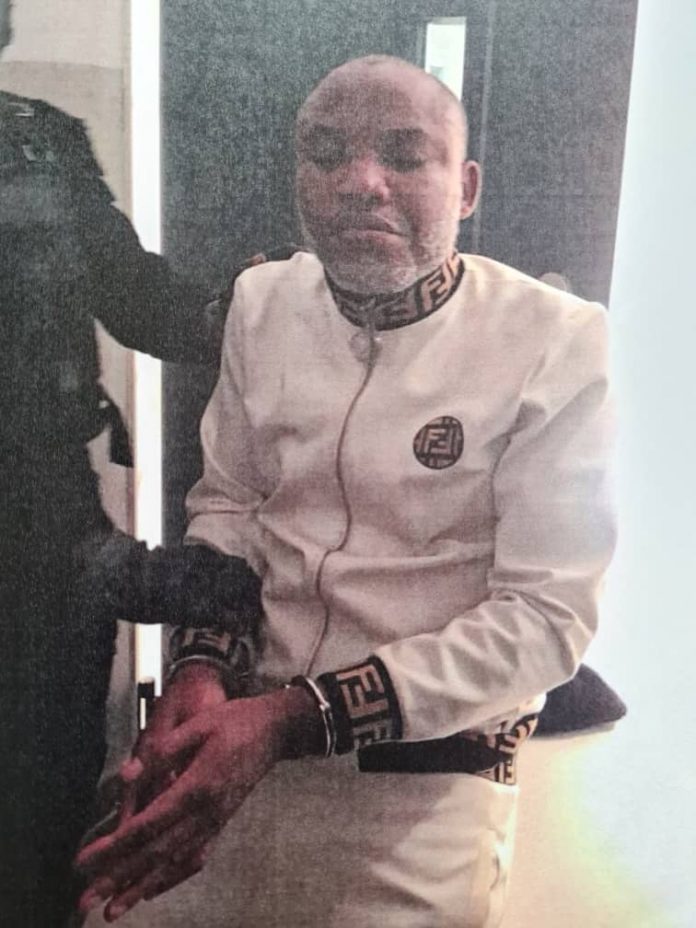Security has been tightened at the Sokoto Custodial Centre following the transfer of the convicted leader of the Indigenous People of Biafra, Nnamdi Kanu, to the facility.
Kanu was on Thursday sentenced to life imprisonment by the Federal High Court in Abuja after being convicted on terrorism and related charges.
In his ruling, Justice James Omotosho ordered that Kanu be taken to a “protective prison,” noting that the Kuje Custodial Centre in Abuja was unsuitable due to past prison breaks and associated security risks.
On Friday, Kanu’s lawyer, Alloy Ejimakor, alleged that his client had been moved to Sokoto.
Speaking with Saturday in Abuja, he said the transfer placed Kanu far from his legal team, family, and supporters, and urged Ndigbo to remain calm.
Although officials of the Sokoto Custodial Centre declined to confirm his arrival, Saturday PUNCH observed unusual security activity around the facility.
Armed personnel were stationed at strategic points within and outside the prison, while a truckload of soldiers drove into the premises—an uncommon development, according to nearby residents.
One resident, who spoke on condition of anonymity, said, “We saw soldiers entering in trucks this evening. The security here has never been this tight.”
The spokesperson for the Nigerian Correctional Service, Jane Osuji, confirmed that Kanu was in their custody but declined to disclose his exact location, citing the sensitive nature of the matter.
Wife, Sowore confirm transfer
Kanu’s wife, Uchechi Okwu-Kanu, confirmed on her X handle that her husband had arrived at the Sokoto prison.
“Information reaching me about three hours ago is that my husband has arrived at Sokoto prison,” she wrote, while criticising some supporters for sharing the development online before informing her.
Activist and publisher, Omoyele Sowore, also posted that the government had “secretly” moved Kanu to Sokoto.
He alleged that the relocation exposed him to danger.
Meanwhile, the Minister of State for Foreign Affairs, Bianca Odumegwu-Ojukwu, appealed for calm, describing the development as unexpected.
She urged Nigerians, particularly those from the South-East, to avoid actions that could inflame tensions.
“This is not the outcome we anticipated nor prayed for, but a reality now upon us… There is an utmost need for restraint,” she wrote.
The minister added that resolving the matter would require broad-based engagement involving political, religious, and traditional leaders from the region.
Ohanaeze, MASSOB reject life sentence
Igbo socio-cultural and advocacy groups, including Ohanaeze Ndigbo, the Igbo National Council, and the Movement for the Actualisation of the Sovereign State of Biafra, have rejected the life sentence handed to Kanu, describing it as selective justice.
Ohanaeze, in a statement by its National Publicity Secretary, Ezechi Chukwu, said the judgment was “a blow to justice” and warned it could further destabilise the South-East. The group’s President-General, John Azuta-Mbata, called on President Bola Tinubu to intervene and pursue a political solution.
Ohanaeze argued that Kanu’s continued detention had become a catalyst for insecurity and youth radicalisation in the region.
Similarly, the President of the Igbo National Council, Chilos Godsent, claimed the judgment was part of an “ethno-political war” against the Igbo and urged President Tinubu to grant Kanu a presidential pardon.
Also, the National Publicity Secretary of the Ohanaeze Youth Wing, Chika Adiele, described the sentence as an assault on justice, accusing the government of selective persecution.
The leader of MASSOB, Uchenna Madu, also rejected the judgment, calling it politically motivated.
Kanu was first arrested in 2015 on charges including treasonable felony. After fleeing Nigeria, he was re-arrested in Kenya and returned to the country in 2021.






